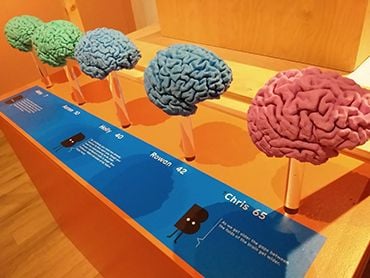Your Amazing Brain: a user’s guide
A collaboration between the Wellcome Centre for Integrative Neuroimaging (WIN) and Banbury Museum & Gallery has brought an interactive exhibition on the brain to new audiences in Oxfordshire.
 Your Amazing Brain, a family friendly neuroscience exhibition hosted at the Banbury Museum and Gallery.
Your Amazing Brain, a family friendly neuroscience exhibition hosted at the Banbury Museum and Gallery.
‘The idea for the exhibition developed from our existing public engagement work, particularly the Brain Diaries events held at the Museum of Natural History in Oxford,’ explains Professor Stuart Clare.
‘Many teachers and educators from outside Oxford attended these events to gather ideas they could use in their own practice. This showed us that there was a huge appetite to engage with our scientific research among those who don’t normally have access to the University museums and activities.’
The WIN team approached the Banbury Museum and Gallery with the idea for the exhibition in early 2018. Developing the exhibition involved ongoing collaboration between researchers, public engagement and communications staff, and the museum team over several years to design and operationalise the exhibits and events. ‘The Banbury team understand their audiences and how to present information in ways that will intrigue and engage them – so they were obviously crucial to the planning and development,’ says Clare.
The exhibition examined what differentiates us from other animals (reflecting WIN research across species and brain evolution), and stages in our lives (rooted in WIN research on brain development and brain disease in old age).
Exhibitions included 3-D models of different brains including from animals and humans at different ages; scans of the brain at different scales to show what neuroimaging can reveal; and ‘hands-on’ and ‘walk-in’ exhibits, including an Ames room which allowed visitors to explore how the brain relates to our vision and perception.
The events programme included an art workshop for people from Oxfordshire Mind, co-facilitated by researchers, and the Big Brain Roadshow aimed at secondary schools. The roadshow showed how learning changes the brain and introduced students to how we use maths and physics to take pictures inside the brain. Researchers working on ageing also joined the museum’s ‘reminiscence group’ to explore neuroscience and memory.
‘We at WIN are all passionate about our research,’ says Clare. ‘The exhibition was a great opportunity to share this passion with others, enabling people of all ages and backgrounds to experience how exciting and inspiring the human brain can be and the enormous potential of brain imaging.’
‘The overall message of the exhibition is that our brains are all different and what make us uniquely us! For young people it’s especially useful to understand that how they experience the world is driven by their brains. And that things they do – diet, exercise, studying etc – can have a big impact on their brain health.
‘We also wanted to show how neuroimaging offers exciting possibilities to better understand brain function which will allow us to develop new treatments and therapies to combat diseases such as Parkinson’s and Alzheimer’s and deal more effectively with mental health problems.’
‘We were delighted with the success of the collaboration with the Museum and with audience reaction to the exhibition. We’ll continue our collaboration with Banbury through the connections we’ve made with local schools and our half-term programme at the museum. We’re also delighted that the Discover Bucks Museum in Aylesbury will be running the exhibition from November 2022 to April 2023, allowing many more people the opportunity to experience it!’
Dr Stuart Clare is Associate Professor and Director of Operations at the Wellcome Centre for Integrative Neuroimaging
Dr Carinne Piekema is Public Engagement Manager for the Wellcome Centre for Integrative Neuroimaging (WIN) and co-lead of the Your Amazing Brain project
Funder: The Wellcome Trust